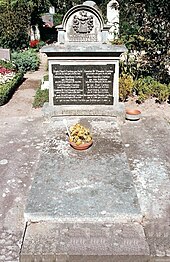Carl Georg Curtius
Carl Georg Curtius (born March 7, 1771 in Lübeck ; † October 4, 1857 ibid) was a German syndic of the council of the Hanseatic city of Lübeck .
Career
Curtius was the son of Carl Werner Curtius, born in Narva , and his wife Anne Catherine Krohn , daughter of the Lübeck syndic Hermann Georg Krohn . After visiting the Katharineum in Lübeck , Carl Georg Curtius studied law at the University of Jena , where he stood out as an outstanding fencer and spokesman for the student body. In 1794 he returned to his hometown and initially became a lawyer. In 1798 Curtius first became a lower court actuary and in 1801, as the successor to the late Hermann Adolph Wilcken, he became the second lawyer of the Hanseatic City of Lübeck . In 1802 he succeeded Carl Henrich Dreyer as the first municipal lawyer in Lübeck. With the interruption of the Lübeck French period , he held this office all his life, i.e. over 50 years. During the last period of the French occupation in 1813, he was a member of the Hanseatic Board of Directors, a kind of government in exile of the three Hanseatic cities with its seat in Stralsund . For this commitment, a street in Hamburg-Hamm was named after Curtius in 1928 .
Curtius was responsible for the affairs of the Hanseatic Stalhof in London, the Bergedorf office in both cities , but also the archive of the Hanseatic city of Lübeck . He was a member of the High Court as an assessor and was accordingly active for the Senate in the formation of the new Higher Appeal Court of the four Free Cities . Curtius campaigned nationally and internationally for the autonomy and independence of the Lübeck city-state and represented this at numerous international conferences and as an envoy in the Frankfurt Bundestag . Interested and well-versed in church issues, Curtius promoted the recognition of the Reformed Congregation in Lübeck and participated in the redesign of the church constitution of the Lutheran State Church in Lübeck. He opposed a separation of church and state, as demanded by the Ministry of Spirituality .

Curtius was involved in the circle around Christian Adolph Overbeck since 1794 in the society for the promotion of non-profit activities, also in various positions of administration. A particular concern for him, both professionally and voluntarily, was the school system, for which he was particularly committed.
His sons Theodor Curtius , Ernst Curtius and Georg Curtius were also well-known personalities of the 19th century.
Fonts
- with Karl Rechlin : Demetrius. Jena 1792 ( digitized version )
- De rei vindicatione iure Lubecensi arctis ad med. limitis circum scripto. Jena 1794
- News from the Lübeck Society for the Promotion of Charitable Activities. Lübeck 1799
literature
- Philipp Wilhelm Plessing : Carl Georg Curtius: Presentation of his life and work. Lübeck: Asschenfeldt 1860 ( digitized version )
- Alken Bruns: Curtius, Carl Georg. In: Biographical Lexicon for Schleswig-Holstein and Lübeck. Volume 10, Neumünster 1994, pp. 69-73. ISBN 3529026506
- Friedrich Bruns : The Lübeck syndicists and council secretaries until the constitutional amendment of 1851 in ZVLGA Volume 29 (1938), pp. 91–168.
- Emil Ferdinand Fehling : On the Lübeck Council Line 1814-1914. Lübeck 1915, No. 10.
- Wilhelm Mantels : Curtius, Carl Georg . In: Allgemeine Deutsche Biographie (ADB). Volume 4, Duncker & Humblot, Leipzig 1876, p. 650 f.
- Rüdiger Kurowski: Medical lectures in the Lübeck Society for the Promotion of Charitable Activities 1789-1839: a patriotic society during the Enlightenment and Romanticism. Schmidt-Römhild, Lübeck 1995 ISBN 3-7950-0463-2 , p. 131
Individual evidence
- ↑ Christian Hanke: Hamburg street names tell history , p. 126. Medien Verlag Schubert, Hamburg, 1997. ISBN 3-929229-41-2 .
| personal data | |
|---|---|
| SURNAME | Curtius, Carl Georg |
| BRIEF DESCRIPTION | Syndic of the Council of the Hanseatic City of Lübeck |
| DATE OF BIRTH | March 7, 1771 |
| PLACE OF BIRTH | Lübeck |
| DATE OF DEATH | October 4, 1857 |
| Place of death | Lübeck |
